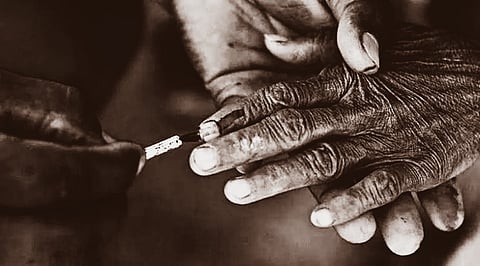

THE ASSOCIATION FOR DEMOCRATIC REFORMS (‘ADR’), an organisation working in the field of electoral reforms, has approached the Supreme Court of India to challenge the Election Commission of India’s (‘ECI’) decision to direct a Special Intensive Revision of Electoral Rolls in Bihar ahead of the assembly elections.
ADR contends that if the ECI’s order, issued on June 24, is not quashed, it will arbitrarily and without due process disenfranchise lakhs of voters, thereby disrupting free and fair elections and undermining democracy, which forms part of the basic structure of the Constitution.
On June 24, the ECI issued an order for a Special Intensive Revision (‘SIR’) of Electoral Rolls, describing it as an effort to ensure that all eligible citizens are included in the electoral roll to exercise their franchise, that no ineligible voters are included, and to introduce complete transparency in the process of adding or deleting electors. The last intensive revision in Bihar was conducted by the ECI in 2003.
As part of the SIR ordered by the ECI ahead of the Bihar assembly polls, residents whose names did not appear in the 2003 electoral rolls must provide one of 11 specified documents to prove their citizenship. Notably, Aadhaar and ration cards are not included among these documents.
The acceptable documents are:
1. Any identity card or Pension Payment Order issued to regular employees or pensioners of Central/State Government or Public Sector Undertakings (PSUs).
2. Any identity card, certificate, or document issued in India by the government, local authorities, banks, post offices, Life Insurance Corporation (LIC), or PSUs prior to July 1, 1987.
3. Birth certificate issued by a competent authority.
4. Passport.
5. Matriculation or educational certificate issued by recognized boards or universities.
6. Permanent residence certificate issued by a competent state authority.
7. Forest Rights Certificate.
8. OBC/SC/ST or any caste certificate issued by a competent authority.
9. National Register of Citizens (where applicable).
10. Family Register prepared by state or local authorities.
11. Any land or house allotment certificate issued by the government.
In its petition, ADR argues that the SIR’s requirement for citizenship documentation disproportionately affects marginalised communities, including Muslims, Scheduled Castes, Scheduled Tribes, and migrant workers, who may lack access to such documents.
The petition asserts, “The declaration required under the SIR process violates Article 326 of the Constitution, as it mandates voters to provide documents proving their citizenship and that of their parents, failing which their names may not be added to the draft electoral roll or may be deleted from it.”
It further contends that the ECI has set an unreasonable and impractical timeline for conducting the SIR in Bihar, given its proximity to the state elections scheduled for November 2025.
The petition states, “Lakhs of citizens whose names did not appear in the 2003 electoral roll lack the required documents. While some may be able to procure them, the short timeline specified in the directive may prevent them from submitting the documents within the stipulated period.”
The petition highlights that Bihar, a state with high poverty and migration rates, has many residents who lack access to documents such as birth certificates or parental records.
It claims, “As per estimates, over 3 crore voters, particularly from marginalized communities such as Scheduled Castes, Scheduled Tribes, and migrant workers, could be excluded from voting due to the stringent requirements of the SIR order. Current reports from Bihar, where the SIR is already underway, indicate that lakhs of voters from villages and marginalized communities do not possess the required documents.”
Section 21(3) of the Representation of the People Act, 1950, allows the ECI to direct a special revision of electoral rolls “for reasons to be recorded.”
ADR claims that the ECI’s directive lacks recorded reasons supported by evidence or a transparent methodology, rendering it arbitrary and liable to be struck down.
The petition argues, “The requirement of citizenship documents contravenes the specific grounds for deletion of names from electoral rolls, such as death, non-residence, or disqualification under Section 16 of the Representation of the People Act, 1950.”
The petition notes that since 2003, Bihar has conducted five general elections and five assembly elections, with continuous additions and deletions to the electoral roll.
It submits, “While the SIR in Bihar or any other state is a positive step, the manner in which the ECI has directed its conduct in a poll-bound state like Bihar has raised concerns among stakeholders, particularly voters.”
The petition also points out that a Special Summary Revision (SSR) was conducted between October 29, 2024, and January 6, 2025, which addressed issues such as migration and ineligible voters due to death or other reasons. Thus, it argues, there is no justification for such a drastic exercise in a poll-bound state.
The petition references a report published in The Hindu on July 1, 2025, titled “Roll Crunch: On the Revision of Bihar’s Electoral Rolls,” which highlights that Bihar has historically lagged in the possession of birth certificates and other official documents, such as matriculation certificates and government-issued IDs.
The petition also contends that, for the first time, the onus of being included on the voters’ list has shifted from the state to the citizen.
The petition has been filed through advocate Prashant Bhushan and drawn by advocates Neha Rathi and Kajal Giri.